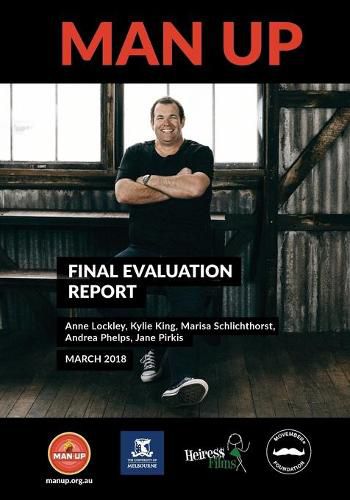Readings Newsletter
Become a Readings Member to make your shopping experience even easier.
Sign in or sign up for free!
You’re not far away from qualifying for FREE standard shipping within Australia
You’ve qualified for FREE standard shipping within Australia
The cart is loading…






This title is printed to order. This book may have been self-published. If so, we cannot guarantee the quality of the content. In the main most books will have gone through the editing process however some may not. We therefore suggest that you be aware of this before ordering this book. If in doubt check either the author or publisher’s details as we are unable to accept any returns unless they are faulty. Please contact us if you have any questions.
We conducted a multi-faceted evaluation of Man Up. We ran a randomised controlled trial (RCT) that gauged how efficacious the documentary was in bringing about changes in help-seeking intentions and views of masculinity in a controlled environment. We posted a survey online to examine similar outcomes in the real world. We also conducted analyses of website and social media data to examine the collective impact of the documentary and broader digital campaign. We drew on combinations of these elements in two final evaluation exercises that considered whether Man Up had changed the way men viewed the term man up and which specific segments of Man Up resonated with audiences.
Our RCT showed that Man Up was efficacious in terms of increasing men’s likelihood of seeking help in tough times and encouraging their friends to do the same, and shifting their views of masculinity. Our online survey suggested that it was effective in enabling men to recognise societal pressures to repress their emotions and be stoic, and increasing their desires for closer relationships with their male friends. These impacts were further underscored by the wealth of positive emails and social media posts about changes in men’s attitudes and behaviours. These outcomes are positive and are made all the more so by the fact that the documentary, and the digital campaign that surrounded it, had such a broad reach.
Our evaluation suggests that the visibility of Man Up itself should be maintained and built upon. Opportunities for screening Man Up in different contexts and for different audiences should be explored, both within Australia and overseas. Broadening the reach of Man Up’s messages has the potential to save the lives of men around the world by shining a spotlight on the relationship between masculinity
and suicide.
$9.00 standard shipping within Australia
FREE standard shipping within Australia for orders over $100.00
Express & International shipping calculated at checkout
This title is printed to order. This book may have been self-published. If so, we cannot guarantee the quality of the content. In the main most books will have gone through the editing process however some may not. We therefore suggest that you be aware of this before ordering this book. If in doubt check either the author or publisher’s details as we are unable to accept any returns unless they are faulty. Please contact us if you have any questions.
We conducted a multi-faceted evaluation of Man Up. We ran a randomised controlled trial (RCT) that gauged how efficacious the documentary was in bringing about changes in help-seeking intentions and views of masculinity in a controlled environment. We posted a survey online to examine similar outcomes in the real world. We also conducted analyses of website and social media data to examine the collective impact of the documentary and broader digital campaign. We drew on combinations of these elements in two final evaluation exercises that considered whether Man Up had changed the way men viewed the term man up and which specific segments of Man Up resonated with audiences.
Our RCT showed that Man Up was efficacious in terms of increasing men’s likelihood of seeking help in tough times and encouraging their friends to do the same, and shifting their views of masculinity. Our online survey suggested that it was effective in enabling men to recognise societal pressures to repress their emotions and be stoic, and increasing their desires for closer relationships with their male friends. These impacts were further underscored by the wealth of positive emails and social media posts about changes in men’s attitudes and behaviours. These outcomes are positive and are made all the more so by the fact that the documentary, and the digital campaign that surrounded it, had such a broad reach.
Our evaluation suggests that the visibility of Man Up itself should be maintained and built upon. Opportunities for screening Man Up in different contexts and for different audiences should be explored, both within Australia and overseas. Broadening the reach of Man Up’s messages has the potential to save the lives of men around the world by shining a spotlight on the relationship between masculinity
and suicide.